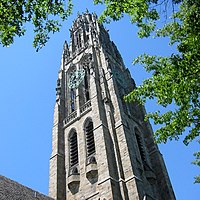
She said that she sees herself as a reporter of generation "Y" and a reporter; a member of the print journalism industry. She gets her "revolutionary cred" from her Yale father who got in to Yale on the strength of his SAT scores.
The revolution in education is being fueled by the growth in the demand in education - there is not enough money to meet that demand. The United States is no longer #1 in education but #10. Will our model translate internationally? No one believes that college is really affordable anymore. The cost of education is outstripping medical care. There is an unprecedented melt-down in access to education. States have defunded education and raising tuition.
She mentions the social problem - "The dumbest rich kids are more likely to attend college than the smartest poor kids." She brought up "Speak: The Miseducation of College Students"
Question: I think she referred to herself as an "outsider." How does graduating from Yale and having two faculty members for parents make one an outsider?
She sees Walmart U and Khan Academy as disruptive technology and included some of the counter-arguments to her book. She does not seem to like online learning much - it has to be hybrid for "socialization" reasons.
She asks about how those who create content are meant to get paid for their work; there is a value in "live performances" that the ipod will not replace.
Currently students cannot get credit for experience, prior learning, or what they know. She thinks that portfolio based assessment is a solution. We still have the problem that employers still consider degrees.
She gave examples of sites like "Koda: The Opportunity Community" - a reputation based network.
We no longer have a linear path through education.
She was at the OER conference in Yale where the Hewlitt Foundation announced their priorities in funding open education projects and access to college.
I like the attention that she is able to give to alternative and collaborative education.
The material in her book is not news to many of those who have been working in education for years. The real news is that this book is coming out of the mainstream press from a writer from an ivy league college. Someone could comfortably read the Chronicle of Higher Education and never really address these questions.
The mark that some kind of transformation has been made will be when the "edupunks" and autodidacts are given the same level of access to the media as those who have followed more traditional and conservative paths.

No comments:
Post a Comment